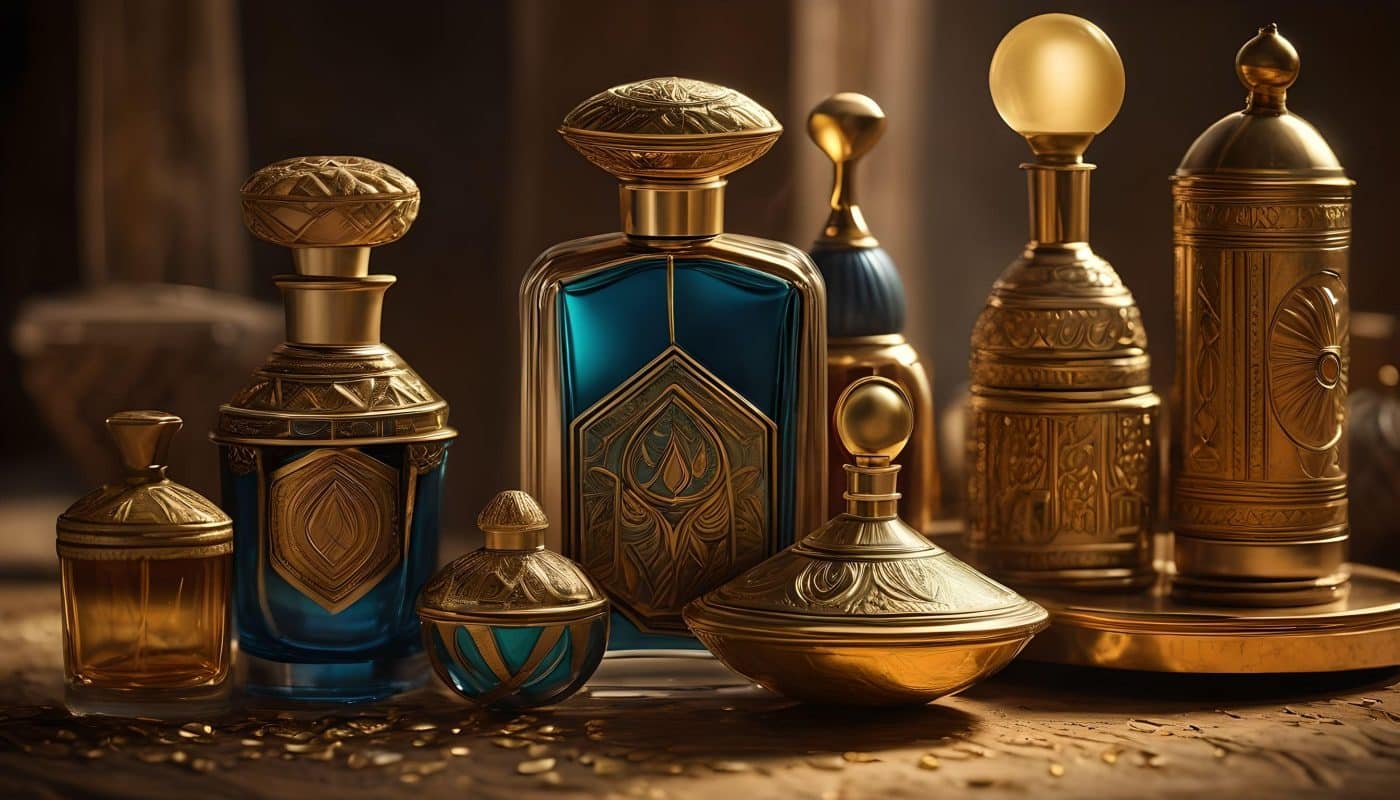History of perfumes
Dating back 4000 years | Descover the history of perfumery
In a world full of scents and sensory experiences, the history of perfumery takes us on an exciting journey into the worlds of beauty and heritage. The fragrance of perfumes is not just a scent, but rather a unique language of expression that travels across time and cultures.
Let’s explore together how the arts of perfumery have evolved over the ages and how Arab civilization has greatly contributed to the development of this unique world.
A historical look at the beginnings of the discovery and manufacture of perfumes: the discovery stage
Fragrances open our doors to an amazing world where art blends with science and culture. The history of perfumery is associated with the emergence of the idea of beauty and the need for self-expression through unique scents. The use of perfumes is an integral part of human history, as it was used by prophets and sages in various cultures for religious and medicinal purposes.
Then the wheel of time takes us to the period of ancient civilizations, where the journey of discovering and manufacturing perfumes began. In the East, perfumes were associated with mythology and religious rituals, with pharaohs using them as part of their religious ceremonies and kings to identify themselves. In the West, the Greeks and Romans considered perfumes a sign of luxury and power.
The development of perfumery throughout the ages: monitoring the main scenes and events in the perfume industry throughout the ages
As civilizations advanced, perfumery techniques developed, and the ingredients used diversified. In the Middle Ages, perfumes were used to purify the air and get rid of unpleasant odors. In the Renaissance, perfumes became a staple of the fashion industry and culture.
We will now monitor the main scenes and events in this exciting development:
Antiquity:
Perfumery has its roots in ancient times when scents were used primarily in religious rituals and medicine. In ancient Egypt, perfumes played a major role in burial ceremonies and celebrations. The Greeks and Romans also used it in worship spaces and daily life.
middle ages:
The perfume industry in the Middle Ages underwent important transformations. Interest in perfumes began to be renewed, and advanced techniques for extracting essential oils emerged. Perfumes were also used to purify the air in the middle period, especially during epidemics.
The Hungarians added a new substance to perfumes that no one had preceded them, which is alcohol, and it is considered that the first perfume in which alcohol was used as a basic substance was in the year 1370 AD. This was commissioned by Elizabeth, Queen of Poland, who loved perfumes and bought them for herself. It was later called Hungarian water after the Hungarians who added it to perfume, as we mentioned.
Renaissance:
With the beginning of the Renaissance, the perfume industry revived remarkably. As perfumes became a part of social life, techniques for mixing ingredients developed, and the names of brilliant perfumers emerged who presented wonderful combinations and created perfumes that expressed luxury and good taste.
Modern times:
With the advancement in technology, the perfume industry has undergone a recent revolution. New methods have been developed to analyze ingredients and design fragrances inspired by modern technology. Companies are using organic chemistry to create unique and lasting scents.
Cultural and social influences:
The perfume industry has been greatly influenced by cultural and social developments. As tastes and aesthetic concepts changed, so did perfume preferences. Perfumes have come to express individual identity and reflect multiple aspects of culture.
Future development:
The perfume industry is heading towards an exciting future, where technology is expected to continue to play an important role in the development of new scents. Fragrances may see greater integration with smart technology, as they are innovatively integrated into people’s daily lives.
A comprehensive summary of Arab contributions to the perfume industry:
On our aromatic journey through history, we find that Arab civilization has made vital contributions to the science of perfumery. Arab scientists played a major role in developing scent extraction techniques and understanding the composition of aromatic components, which made them a fundamental focus in the history of this unique art.
The most prominent Arab contributors to the development of the principles of perfumery: “Immortalizing the names that contributed to the formation of the science of perfumery and establishing principles for it.”
Among the most prominent Arab contributors to the science of perfumery was the scientist Ibn al-Haytham, who contributed significantly to the development of methods for extracting essential oils. He undertook an in-depth study of how to use steam to extract perfumes from plants, which contributed to the development of distillation techniques that are still used to this day.
The Persian scientist Ibn Sina took an important place in perfumery, establishing a scientific understanding of the process of creating scents and their effect on the senses. In his book “The Law of Medicine,” Ibn Sina provided a comprehensive classification of perfumes and their blends, which helped expand people’s understanding of their uses and effects.
During the Abbasid Caliphate, the caliphs encouraged innovation and scientific research. Libraries in Baghdad and Cairo contained hundreds of thousands of manuscripts dealing with the arts of perfumery. There were also workshops where scientists worked on their experiments and innovations in this field.
Cultural and social influences:
Arab civilization was a place of cultural exchange, where artistic and scientific knowledge blended between East and West. The perfume industry has been influenced by various cultures and religions, giving it a special character and diversity.
Unique Muslim Contributions to Perfumery Processes: “Unique Contributions of Arabs Distillation as a Model”
Over the centuries, Arab scientists have developed many unique processes in perfumery. They have created advanced extraction techniques using essential oils and rose water. They also introduced advanced methods for mixing ingredients precisely, which positively affected the quality of perfumes.
Arab scientists and manufacturers created many unique processes that contributed to the development of the perfume industry and made it characterized by uniqueness and sophistication. Here are some of the unique operations they performed:
Extracting essential oils by distillation:
The Arabs invented the process of extracting essential oils using distillation, which is an effective process that relies on…
Evaporating aromatic materials and condensing their vapor to obtain pure oil. This process was an important and lasting innovation in the history of perfumery.
Mist Technique (Persian Musk):
The Arabs introduced a unique technique for using musk, as they prepared it using the mist technique. This process consists of putting deer musk in a bottle and then leaving it until the oil is saturated with the scent of musk. This method was considered among the best ways to extract the scent of musk.
Mix ingredients thoroughly:
The Arabs invented advanced techniques in the field of mixing ingredients precisely, as they studied the chemical interactions between the different ingredients. They were able to find unique and balanced compositions, which gave Arabic perfumes distinction and appeal.
Use of natural materials:
The Arabs played a major role in using natural materials in the manufacture of perfumes. Scientists were among the first to make effective use of flowers, woods, and spices, giving Arabic perfumes a unique, natural touch.
Attention to manufacturing details:
The Arabs invented precise methods for manufacturing perfumes, as they paid attention to the smallest details from choosing materials to mixing and storage processes. This contributed to achieving the highest levels of quality and excellence.
Innovation in perfumery:
Arab scientists contributed greatly to the development of the science of perfumery, as they provided detailed studies on the properties of aromatic ingredients and how they affect the senses. They also excelled in documenting the chemical and physical processes of manufacturing perfumes.
These unique processes carried out by the Arabs in manufacturing perfumes were not just artistic creations, but rather an expression of their intelligence and deep understanding of the science of scents and the art of perfume making.
Ultimately, the history of perfumery remains a testament to the evolution of human creativity and its ability to transform scents into art.


